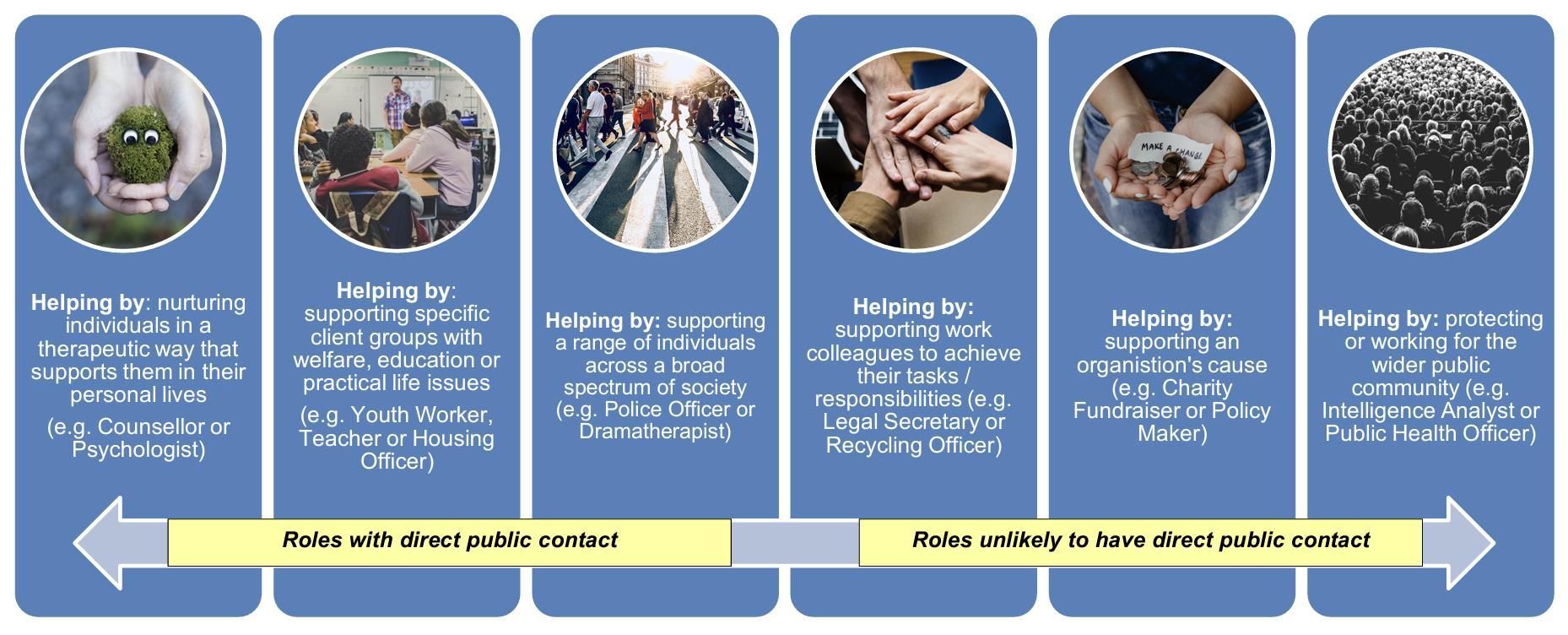
Introduction
Choosing a career can seem overwhelming. There is no ‘crystal ball’ to tell you your perfect career, in fact there are likely to be a number of careers that might suit you. Making career decisions is about understanding yourself and having an awareness of the type of opportunities out there.
If you are reading this guide then presumably you have already considered you want a career that involves ‘helping people’. This guide aims to assist you in defining what ‘helping people’ means to you and considers a spectrum of ‘helping careers’ .
Please also refer to our ‘Guide to Career Direction’ to assist with further career decision making and planning.
‘Helping People’ – What Does This Mean?
Part of making a decision about a career that helps people is to define what ‘helping people’ means to you. We could argue that the majority of careers help people in some way. For example, an ecologist conducting surveys to monitor species and their habitats is helping people to understand more about ecology through their research; a curator is helping people to engage with an arts or museum exhibition; or an accountant is helping people in business manage the finances.
To help define what ‘helping people’ means to you, consider asking yourself the following questions:
When have you helped?
• When have you been involved in helping others before (if applicable)? (this could include helping family members, friends, as part of a volunteer role, within a job)
• What did you enjoy about helping others?
• What aspects of your previous experience of helping others might you want to see in your future career?
Regardless of whether or not you have had any personal or professional experience of helping others, in your future career…
Who are you helping?
• Are you helping colleagues or people you work with?
• Are you helping people who work in businesses or other organisations?
• Are you helping members of the public who might be accessing a service?
• If you want to help members of the public in some way, are there types of ‘client groups’ you want to help (e.g. young people, older people, carers, offenders, disabled people etc) or do you want to work in a role where you could be helping people from a range of backgrounds and with a variety of personal circumstances?
Why are you helping?
• What are your personal motivations to help others?
• Why do the people you are helping need help?
• Do the people you help need support because of their personal circumstances or do they need support within their professional lives?
How are you helping?
• Are you helping by taking action and doing something on someone’s behalf?
• Are you helping by giving advice and / or guidance?
• Is the way in which you help on a 1:1 basis or a group basis?
Where are you helping?
• Are you helping while working for a private company, a public organisation or a charity?
• In what types of settings might you be helping?
• Are you based in the same setting, or might your role involve travel or moving to different locations?
• What types of organisations might you see yourself working for, or could you be helping people on a self-employed basis?
What does your helping career look like?
• Do you envisage a career in which you are working in one role that is focused on ‘helping’ others or might you consider a ‘portfolio’ career where you have a number of different roles at any one time, of which one is a helping role? (for example, you might work three days a week as Furniture Designer and two days a week helping with teaching design in a college)
• Could your helping career be a volunteer role (alongside other paid employment)? (for example, you might be working full-time as a Marketing Executive but volunteer for St John Ambulance helping people at large events and festivals)

